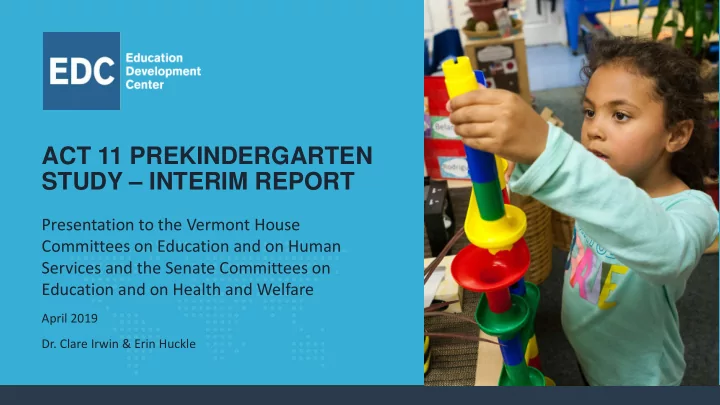

ACT 11 PREKINDERGARTEN STUDY – INTERIM REPORT Presentation to the Vermont House Committees on Education and on Human Services and the Senate Committees on Education and on Health and Welfare April 2019 Dr. Clare Irwin & Erin Huckle
Agenda Study background 1 Overview of study & status report 2 Interim report findings 3 Next steps 4 Act 11 PreK Study - Interim Report Presentation | edc.org 2
Study background • Act 166, passed in 2014, was fully implemented beginning 2016/17 • 75% of 4 year olds • 60% of 3 year olds • Act 11, section E.500.7 – how to more effectively and efficiently provide state- funded, universal preK • Study timeline: October 2018 > Interim Report March 2019 > Final Report July 2019 Act 11 PreK Study - Interim Report Presentation | edc.org 3
Key areas of interest for Act 11 preK study How well is the funding How are families making model working? choices about preK? Does the system Does the current system provide equitable create undesired access? outcomes? How can oversight be simplified? Act 11 PreK Study - Interim Report Presentation | edc.org 4
Status update – completed activities • Conducted, analyzed, and summarized findings from 13 semi-structured interviews • the state legislature, AOE, AHS, Vermont School Boards Association, Vermont Superintendents Association, Building Bright Futures, and the University of Vermont • Systematic review of research literature Act 11 PreK Study - Interim Report Presentation | edc.org 5
Next steps • Conduct, analyze, and summarize findings from 30 semi-structured interviews • Randomly-selected, representative sample of public and private program directors and principals • Survey of families regarding preK program choice • Analysis of data from AOE • Draft final report and submit by July 1, 2019 Act 11 PreK Study - Interim Report Presentation | edc.org 6
QUESTIONS? Act 11 PreK Study - Interim Report Presentation | edc.org 7
Delivery models • Most interviewees supported the mixed-delivery system • Positives: Caregiver choice, convenience, enrollment capacity, cross-sector collaboration • Shortcomings: Misperceptions and mistrust between public and private, cross-sector applicability of regulations • Some experts commend mixed-delivery systems while others raise concerns over inequities across public and private settings Act 11 PreK Study - Interim Report Presentation | edc.org 8
Funding models • Interviewee concerns included • Distribution of public funds to private providers • Possible inequities in the amount of funding provided to public vs. private providers • K-12 funding formulas are best option to provide consistent and adequate support • States with mixed-delivery based on K-12 have set guidelines to promote equitable distribution of funds • Pay for Success is a newer approach to funding early childhood education Act 11 PreK Study - Interim Report Presentation | edc.org 9
Access and dosage • Mixed opinions among interviewees regarding universal vs. targeted preK • Interviewees suggested increasing the number of preK hours offered • Research indicates all children benefit from preK, but low- and middle-income children benefit the most • There is an unclear relationship between weekly hours of preK and child outcomes • Research shows increased short-term gains for children attending 2 years of preK, compared to those attending for only 1 year Act 11 PreK Study - Interim Report Presentation | edc.org 10
Quality • Interviewees expressed concern over variation in teacher qualifications across settings • Interviewees recommended simplification of STARS and accessible professional development opportunities • Instructional supports and other aspects of process quality are most important for supporting children’s school readiness • Research has found no or a limited relationship between educators’ level of education and child outcomes Act 11 PreK Study - Interim Report Presentation | edc.org 11
Administration • Many interviewees supported moving administration to one agency, while others suggested a new stand-alone agency, and others preferred joint agency oversight • Recommendation to centralize preK contracting and payments at the state level • Some suggested shifting responsibility for delivery and oversight to regional level • Research does not identify a single best practice or model for administering preK • There are benefits to consolidating early childhood initiatives at the state level Act 11 PreK Study - Interim Report Presentation | edc.org 12
THANK YOU Dr. Clare Irwin cirwin@edc.org Erin Huckle ehuckle@edc.org Act 11 PreK Study - Interim Report Presentation | edc.org 13
Recommend
More recommend